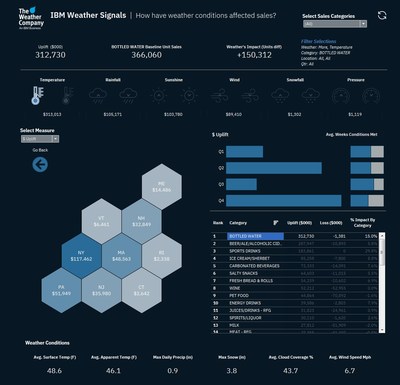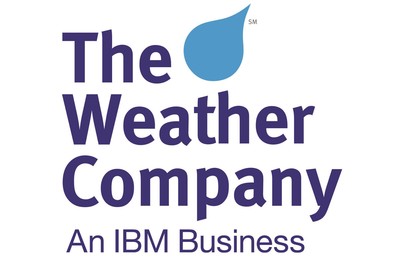All press releases
IBM Weather Signals Uses AI to Enable Predictive Weather-based Business Forecasting
ARMONK, N.Y., May 22, 2019 /PRNewswire/ -- IBM (NYSE: IBM) and its subsidiary The Weather Company today announced IBM Weather Signals, an AI-based tool designed to help companies predict how fluctuations in weather can impact business performance, even months in advance. With this insight, businesses can proactively adjust supply chains to help ensure accurate inventory, staffing and promotional activities aligned with anticipated changes in local weather conditions.

IBM Weather Signals uses Watson AI to merge weather data with a company's operational data to create a model that can predict how anticipated seasonal weather conditions, or even minor fluctuations in temperature, wind chill or humidity, are anticipated to impact business performance, right down to sales of individual product categories at specific locations.
Integrating this insight into supply chains, companies can then redirect inventory to meet anticipated changes in demand – for example a fashion retailer can time the introduction of seasonal clothing lines to the start of the seasonal weather or a tourist attraction can anticipate how humidity might impact visitors' willingness to stand in line and adjust staffing or pricing. These insights can help increase productivity and reduce waste to potentially add millions to the bottom line.
To help companies better integrate weather into their business planning process, IBM Weather Signals' output can be used with common analytics platforms like Tableau. This provides interactive capabilities to model the correlation between weather and business performance within the context of overall business forecast planning, and within an intuitive dashboard environment, without having to migrate data to a new platform.
IBM Weather Signals has applications across a broad range of industries and is particularly relevant to industries that are sensitive to changes in daily or seasonal weather conditions such as retail, consumer packaged goods, services, hospitality, entertainment and travel and transportation.
"Companies instinctively know that weather impacts their businesses, but most rely on historical weather norms to make assumptions about the future," said Kristen Lauria, General Manager of Watson Media and Weather. "Weather Signals provides powerful insight into the correlation between real-time changes in weather and corresponding changes in local business performance -- even months in advance. That insight can potentially add millions to a company's bottom line."
IBM also recently announced Weather Decision Platform for Agriculture, which combines AI, hyper-local weather data, and IoT data to give farmers around the world greater insights about planning, plowing, planting, spraying and harvesting.
IBM acquired The Weather Company in 2016 and has since been helping clients from travel and transportation, to logistics and supply chain, to better understand and mitigate the cost of weather on their businesses. IBM Weather Signals and IBM Watson Decision Platform for Agriculture are the latest innovations in IBM's efforts to make weather a more predictable business consideration. The combination of rich weather forecast data and IBM's AI and Cloud technologies provides a unique capability, which is being leveraged by agriculture, energy and utility companies, airlines, retailers and many others to make informed business decisions.
About The Weather Company, an IBM Business
For more information, visit https://newsroom.ibm.com/the-weather-company.

SOURCE The Weather Company, an IBM Business
